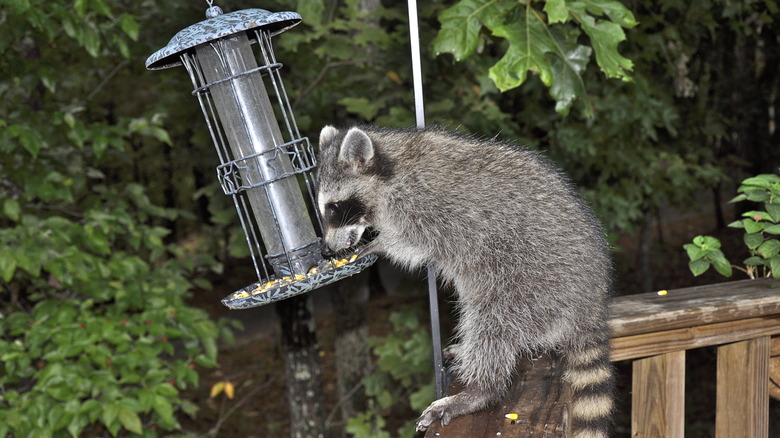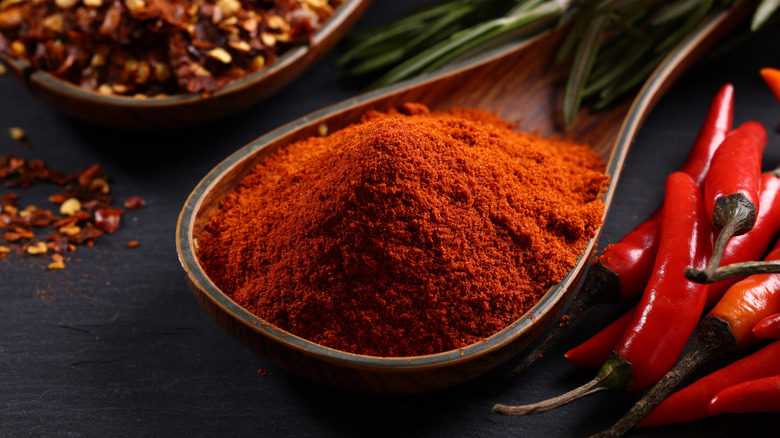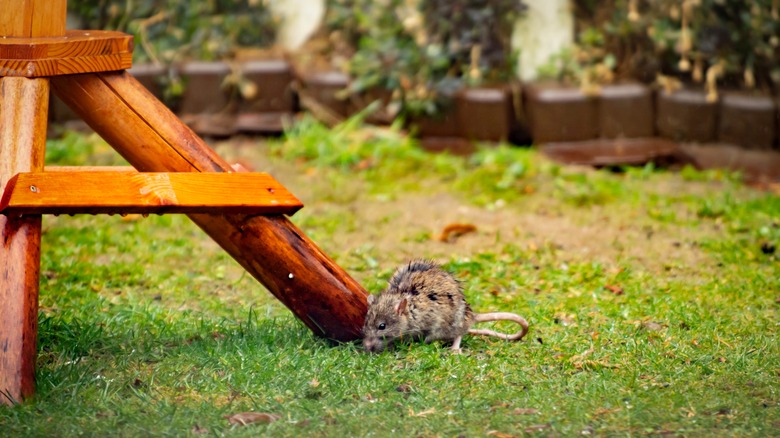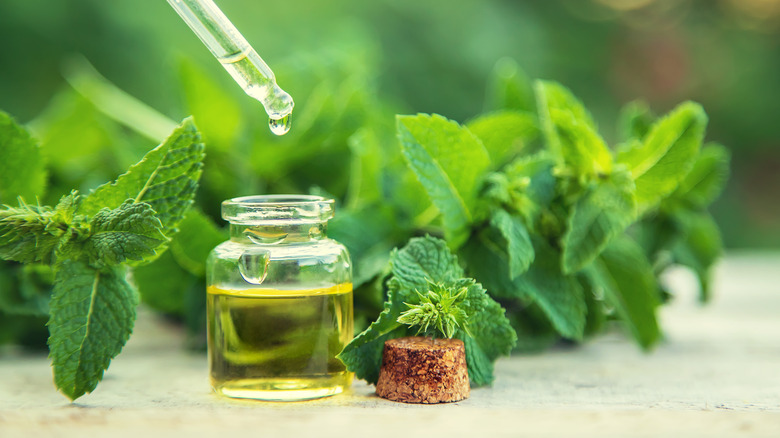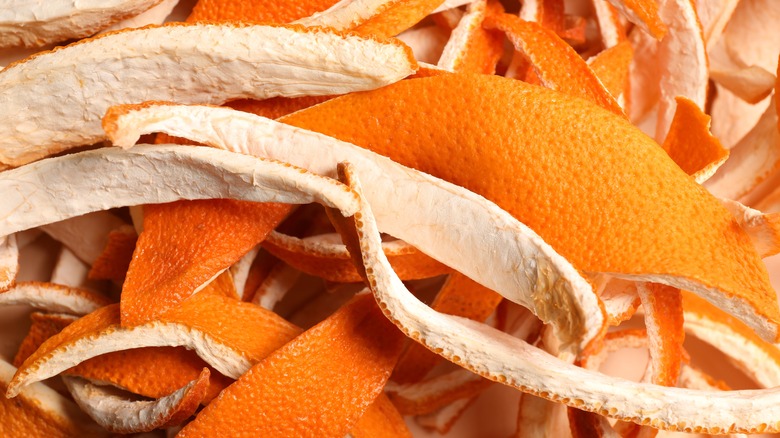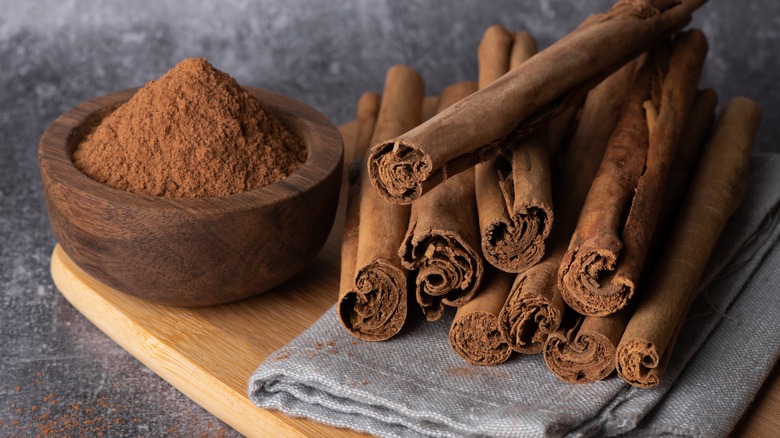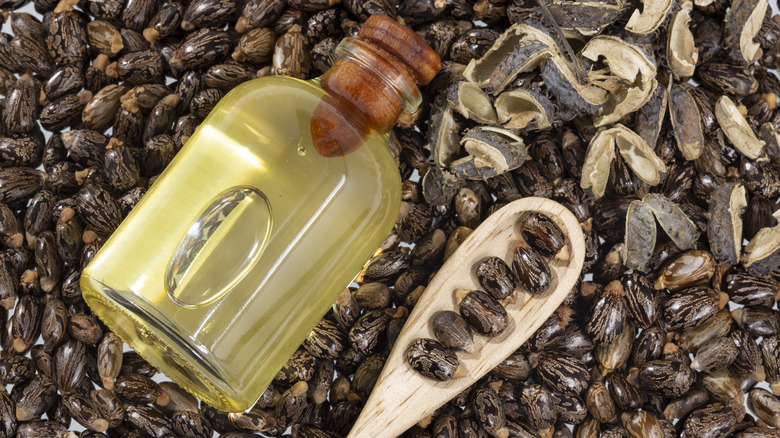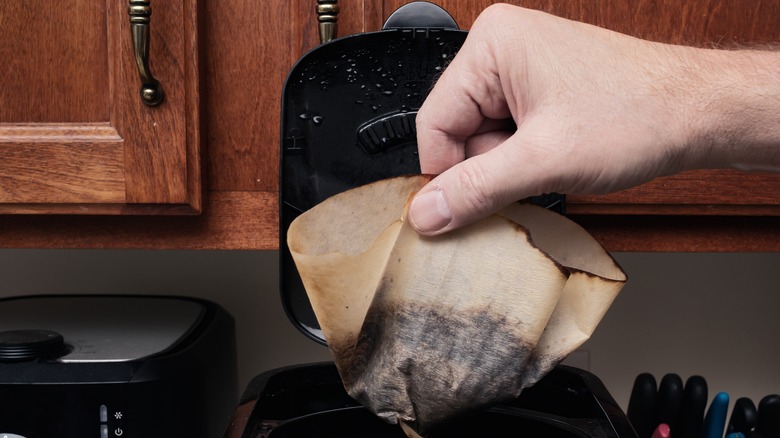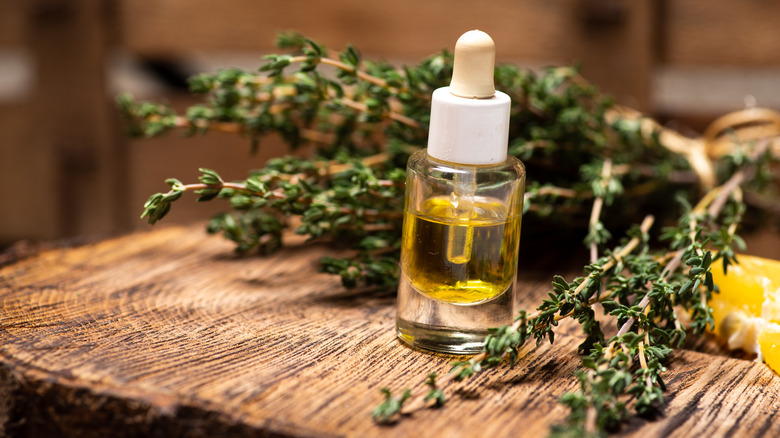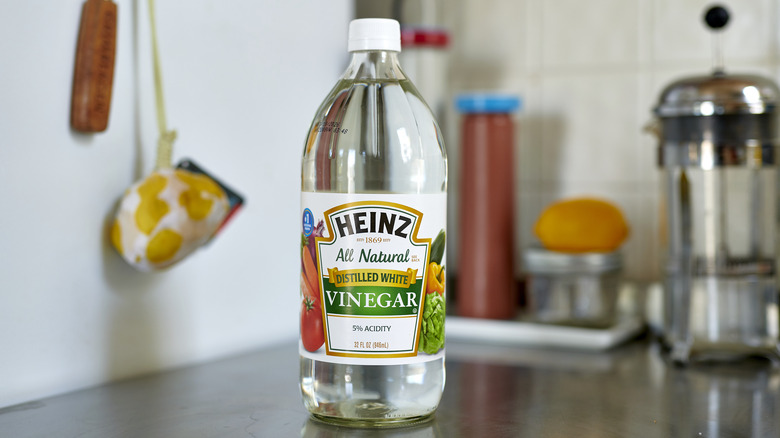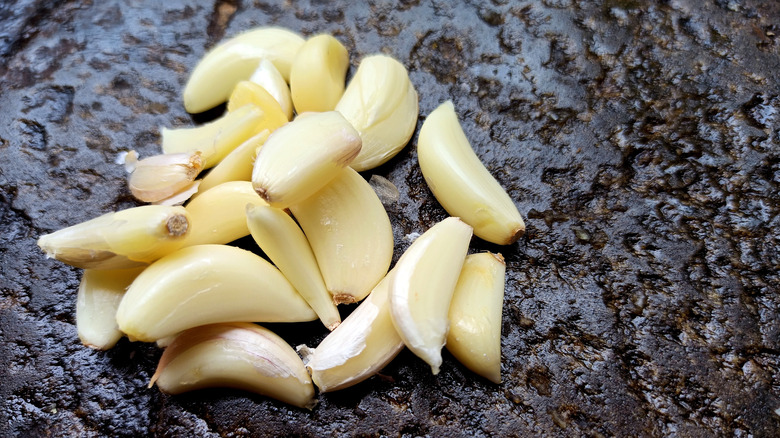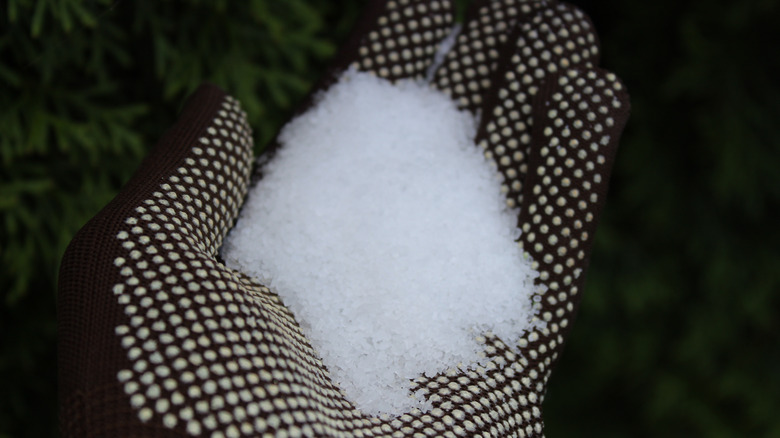Sprinkle These Common Kitchen Ingredients Around Your Bird Feeder To Put An End To Your Pest Problem
One of the benefits of having a bird feeder in your yard is being able to watch the feathered visitors enjoy your hospitality. However, it's a nuisance when unwelcomed insects and animals show up to spoil the fun. Fortunately, a few common kitchen ingredients can serve as repellents to keep annoying raiders away from the birds' dinner.
To turn away pests without harming or poisoning them, you can introduce substances that the animals dislike. Bird-feeder intruders like mice, rats, squirrels, and raccoons have an exceedingly acute sense of smell , compared with birds. For this reason, you can drive them away with scents they avoid, like essential oils, peppermint, and vinegar. Additionally, the invaders will steer away from areas that are treated with hot, spicy ingredients, including the capsaicin in cayenne pepper and chili powder. The substance irritates their eyes and nasal passages, so they opt to leave the area. See how these and other common kitchen ingredients can help to ensure that your backyard birds are allowed to feed undisturbed by mammal and insect marauders.
The pesky animals hate cayenne and black pepper
To discourage squirrels, mice, raccoons, and other varmints from eating the seed and suet that you put out for the birds, you'll want to make the area around the feeders as unpleasant for them as possible. Fortunately, the animal pests have amazingly sensitive noses, but the birds do not. That's where pepper comes in as a pest repellent that deters the animals but does not permanently harm them. Meanwhile, the birds are mostly oblivious to your efforts.
You can sprinkle either black pepper or cayenne pepper on the ground around your bird feeders to ward off the critters, but don't apply it directly to the birdseed. Capsaicin is the ingredient that makes cayenne and chili peppers so hot and spicy. If you don't want to use pepper from the kitchen, you can purchase capsaicin in powdered or liquid forms and sprinkle it around the area where the birds feed. Continue to reapply the pepper or capsaicin on a regular basis, as it's likely to blow away in the wind or wash away after a rain. Be aware that some master gardeners warn against using cayenne or other granulated peppers in your yard. Although it is not toxic to animals and pets, it does cause temporary burning pain in the eyes and nasal passages when animals dig in the dirt where capsaicin or cayenne pepper has been applied.
Try these recipes for a DIY wildlife repellent spray
Instead of sprinkling a hot and spicy condiment around your bird feeders to drive away animal pests, you might want to spray the area. Both the Centre Wildlife Care organization and the city of Brighton, Colorado provide easy recipes for a homemade spray that's made from inexpensive kitchen ingredients. The concoction is a humane solution to the animal problem, as it repels the varmints but does not permanently hurt them. Lacking a strong sense of smell, the birds will continue to frequent the feeders while the animal pests with an acute sense of smell will head away from them.
To get started, fill a large pot with 2 quarts of water and heat it on the stove. Meanwhile, chop one whole yellow onion and one jalapeno pepper. Add them to the water and stir in 1 tablespoon of cayenne pepper. Boil the mixture for 20 minutes and then allow it to cool. Strain the water through cheesecloth or a strainer to remove the solid chunks of onion and pepper. Then, pour the liquid into a garden sprayer or a spray bottle. Spritz the area around your bird feeders every day for two weeks to convince animal pests that they should stay away. After that, you can reapply the spray periodically, especially after rainfall.
Peppermint and peppermint oil will deter rodents
Peppermint is one of the scents that animal pests find offensive. Squirrels, chipmunks, mice, rats, and raccoons will avoid peppermint. Essential oil is the most convenient form of peppermint for application around feeders. If you use peppermint oil to repel bird-seed raiders from the feeders, keep in mind that it might repel the birds, as well. For that reason, you should avoid placing the peppermint oil directly on the birds' food.
To apply peppermint oil around your bird feeders, you can mix it with water and spray it. Simply add 4 to 5 drops of peppermint oil and a bit of rubbing alcohol to a spray bottle of water and use the liquid repellent to saturate the area. Alternatively, you can soak cotton balls in peppermint oil and place them near your bird feeders. For example, a mixture of 1 teaspoon peppermint oil with 1 teaspoon chili powder and 1 tablespoon tabasco sauce stirred into 2 cups of cold water makes an effective solution for soaking cotton balls. Place the saturated cotton balls all around the bird feeders to make the area unattractive to invaders. You'll need to reapply the peppermint spray or refresh the cotton balls on a daily or weekly basis to maintain the strong scent that repulses those persistent bird-seed raiders. It's especially important to treat the area after rain washes away the peppermint scent.
Citrus peels deter cats from hanging around
Stray cats pose a problem around bird feeders. They're not there to eat the birdseed, but they do prey upon the birds that come to feast. For that reason, you'll want to make the bird-feeding area unattractive to the cats. To deter cats in a humane way, you can introduce the scent of lemons, oranges, and other citrus fruits. Citrus fruits are toxic to cats, so they're naturally repulsed by the scent.
If you eat citrus fruits or drink fresh juice on a regular basis, it's easy to simply deposit the peels on and around the bird feeders in your yard. As an alternative, you can make a DIY spray that will drive away the feline population. Add bottled lemon juice and dried rosemary to a spray bottle containing white vinegar. Shake the bottle to mix the ingredients, and spray the solution around your bird-feeding area. Cats hate the scents of lemon, rosemary, and white vinegar, and they'll steer away from the odor of the DIY spray.
Animal pests tend to avoid cinnamon around bird feeders
Although we might sprinkle it on oatmeal or stir it into our lattes, cinnamon ranks in the list of scents that animals detest. The active ingredient is Cinnamaldehyde, a natural flavonoid derived from plants in the genus Cinnamomum. It gives cinnamon the flavor and fragrance that humans enjoy. However, it's a compound that repels mosquitoes, cockroaches, cats, dogs, squirrels, and raccoons. Especially in powdered form, cinnamon irritates the nasal passages of the bird-feeder invaders when they breathe it in, and the unpleasant sensation sends them packing.
The easiest method for repelling animal pests with cinnamon is to liberally sprinkle the powder around the feeders. The birds may find it irritating, as well, though, so it's best to avoid applying it directly to the birdseed. In addition to producing an irritating effect for the animal pests, the scent of cinnamon masks the enticing food scents that draw the animals to the feeders. Keep in mind that sprinkling cinnamon around your backyard is a temporary fix. You'll need to reapply the condiment daily or every few days, especially in windy or rainy conditions.
Castor oil is safe for humans and pets, but pesky intruders detest it
In bygone years, castor oil was commonly used as a foul-tasting stimulant laxative for humans. In addition to its medicinal purposes, castor oil is employed as a repellent for mammals that become a nuisance in residential areas. They hate the taste and smell of this oil that is extracted and processed from the seeds of the Ricinus communis plant. It's a humane treatment that does not harm animals but simply repulses them with its detestable odor and nasty taste.
The easiest way to apply castor oil is to spray a liquid mixture on the ground around your bird feeders. Add 8 ounces of castor oil and 8 ounces of liquid dish detergent to 1 gallon of water. Mix well and pour the mixture into a garden sprayer. Saturate the area around your bird feeders with this concoction to drive away mammal pests. The treatment is non-toxic and safe for children and domestic pets. Reapply the castor oil mixture on a periodic basis, especially after rainfall.
Deposit your coffee grounds around the bird feeder to keep pests at bay
If you love a cup of Joe in the morning, you probably dispose of coffee grounds every day. Instead of throwing the grounds away, why not use them to deter animal pests from visiting your bird feeders? Animals and insects do not like the scent of coffee grounds, probably due to the acid content. Sprinkle the used grounds around the feeders to drive away cats and squirrels . If you have hummingbird feeders placed around your yard, coffee grounds serve as a repellent for the ants, bees, and wasps that are drawn to the sugary nectar.
As a deterrent, you'll need to use coffee grounds and not whole beans. For bird lovers who do not drink coffee, your local barista or a friendly neighbor might help out by passing along used grounds. Avoid placing the coffee grounds directly on the birdseed or in the feeders. The caffeine in coffee is toxic for birds. It causes cardiac distress and may lead to cardiac arrest for your feathered friends. If you do sprinkle coffee grounds around the bird feeder, you'll need to replenish the supply on a regular basis, especially after rainwater causes the grounds to dissolve into the soil.
The scents of some essential oils will keep animals away from your bird feeders
In an effort to feed the birds while repelling the animal intruders, you search for humane ways to drive away certain animal species while enticing others. Applying essential oils is a viable method for maintaining this delicate balance. When you introduce obnoxious or irritating scents, it makes the bird-feeding area a place where rodents and other animal pests don't want to hang out. Fortunately, birds have a minimal sense of smell, compared with other critters, so they don't mind the scents of most essential oils.
Squirrels , rats, mice , raccoons , and cats all hate the smell of peppermint oil, but birds also don't like this scent. For this reason, it's best to apply peppermint oil to the ground around the feeders but not on the feeders where birds alight. Mix 20 drops of peppermint essential oil in 16 ounces of water to make a spray that you use to saturate the area around your bird feeders. In addition to peppermint oil, small mammal invaders will stay away from the smell of eucalyptus oil. Cats avoid the scents of lavender oil, lemongrass oil, and citronella oil as well as eucalyptus and peppermint. Any essential oils can be diluted with water and sprayed as pest repellents. Alternatively, you can saturate cotton balls or pieces of cloth with the essential oils and place them in the vicinity of your bird feeders. Replenish the oils on a regular basis as the scents will dissipate.
Cotton balls soaked in white vinegar serve as a pest repellent
You can humanely keep unwanted critters out of your yard and away from your bird feeders by permeating the ground around them with the scent of a common kitchen staple: white vinegar. The animals find it irritating and unpleasant. This liquid that many people use for cleaning purposes contains 5% acetic acid. As a result, the smell of white vinegar is abhorrent to many animals.
The easiest way to use white vinegar as a repellent for squirrels , raccoons , cats , rats, and mice is to spray the area around your bird feeders with a diluted mixture. Pour equal parts white vinegar and water into a spray bottle and add 1 teaspoon of table salt. Shake well to mix the ingredients, and spray the area liberally. Be aware that you should avoid spraying the white vinegar on your plants, as it may have a corroding effect on them. For this reason, you might want to employ cotton balls as a means for introducing the repellent in your bird-feeding area. Simply fill a small bowl with white vinegar and allow the cotton balls to sit in the liquid until they're saturated. Place them on the ground around the feeders. Repeat the process regularly, especially after rainstorms.
Sprinkle garlic around your bird feeder to drive away insects and rodents
When garlic cloves are crushed, they release a volatile organic sulfur compound called allicin . This is the substance that gives garlic its strong odor, which is why you should put garlic around your bird feeder. Ants and flies, as well as raccoons , possums, rats, and mice give a wide berth to areas that smell like garlic. The pungent smell is overwhelming to them, and they find it repulsive.
To make a garlic spray for the area around your bird feeders, you can add 2 tablespoons of freshly pressed garlic to 1 liter (or 1 quart) of water. Let it sit overnight and then pour the liquid into a spray bottle or garden sprayer. As an alternative method, you can place fresh garlic in mesh bags that you hang from trees and plants near the feeders. Additionally, garlic oil is an effective form of this repellent. Mix it with water to make a spray, or soak cotton balls in garlic oil to place them around the bird-feeding area. Be sure to replace the garlic when the smell dissipates or gets washed away by the rain.
Epsom salt has some anecdotal evidence as a pest repellent
Despite its name, Epsom salt is not similar to table salt. It's not typically a kitchen ingredient, but many people do keep Epsom salt around the house. Added to bath water, it creates a soothing experience to relieve stress and muscle soreness. To solve your bird feeder pest problem, there is anecdotal evidence that Epsom salt repels some small mammals. Scientists at McGill University report that racoons avoid Epsom salt. Additionally, pest control professionals recommend this household staple to repel mice, rats, and squirrels. Epsom salt is made of the chemical compound magnesium sulfate, a combination of magnesium, sulfur, and oxygen. Although it is odorless, this compound has a bitter taste that repulses the animals.
It's easy to sprinkle Epsom salt on the ground around your bird feeders to make the space unpleasant for invading animals. As an added bonus, some gardeners assert that it improves the composition of soil that is deficient in magnesium or sulfur and acts as a fertilizer for plants. The application should be repeated on a regular basis, as the Epsom salt will dissolve into the soil with rainfall. It's worth noting that there doesn't seem to be any scientific evidence that Epsom salt works as a pest deterrent; in addition, despite some gardeners touting its success, it can have adverse effects on plants in your garden. However, since this product is widely available and inexpensive, you won't lose much by trying it out.
